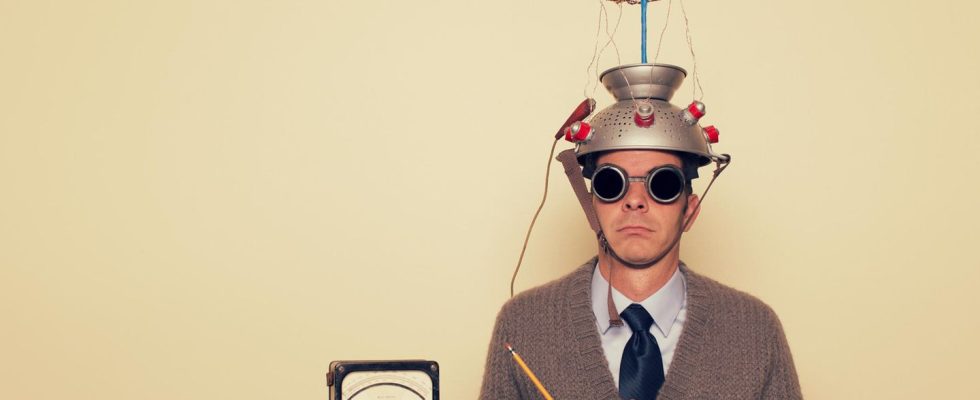Good to know
Dunning-Kruger Effect: Why we are sometimes not as smart as we think
Some people think they are smarter than they actually are
© RichVintage / Getty Images
Manage a project, repair the car yourself? No problem! And then we fail after all – because of our own overconfidence. The whole thing even has a name: the Dunning-Kruger effect. But why do we sometimes think we are smarter than we are?
Oskar Wilde once said, “Humanity’s dilemma is that the idiots are so self-assured and the intelligent so full of self-doubt.” And even if the Irish writer died before this century began, his testimony still holds true today. What he describes – formulated somewhat exaggeratedly – is now even a well-researched psychological phenomenon called the Dunning-Kruger effect. Roughly speaking, it describes people’s overconfidence. Something that basically can happen to any of us from time to time. But why do we sometimes think we are smarter than we are?
There is still no clear answer to this question, explains Dr. Christian Lange-Asschenfeldt, specialist in neurology and psychiatry and psychotherapy as well as chief physician and medical director of the Oberberg Specialist Clinic Düsseldorf-Kaarst in conversation with the star: “The Dunning-Kruger effect has received little attention in the literature. This is mainly due to the fact that the level of suffering in this case is not too great. That is why there is very little research on the effect compared to the imposter phenomenon, although we all encounter it in everyday life.
Controversial theory of overconfidence
All theories that can currently be found about the phenomenon are based on a series of studies by the two American psychologists David Dunning and Justin Kruger from 1999. At that time, the two left some Students first solve logic and grammar tests. The participants were then asked to rate how well they performed compared to the others. Lo and behold – those who had done the worst were most likely to believe in their success. According to the study leaders, this is a clear indication that incompetent people unconsciously overestimate their abilities. The birth of the Dunning-Kruger effect.
In order to be able to better explain the phenomenon, the scientists developed a four-stage model of self-perception. It still serves today as an explanatory model for the overestimation of self by half-knowing people.
- Incompetent people often overestimate their own abilities
- They are unable to appreciate the extent of their incompetence
- Due to their ignorance, they do not expand their competence
- As a result, they underestimate the superior abilities of other people
In the course of time there has been criticism of the theory from time to time. The philosopher Edward Nuhfer and the psychologist Steven Fleischer from California State University also took up a core point of criticism in a study. In it they criticized Dunning and Kruger’s connection between intelligence, self-reflection and education. Their argument: educated people are simply more practiced in recognizing the limits of their knowledge.
Why we overestimate ourselves
In fact, the causes of the Dunning-Kruger effect are manifold, says Dr. Lange-Asschenfeldt dem star. The personality structure plays a major role in the development of cognitive distortions such as overconfidence, while the intelligence quotient plays a lesser role. The Dunning-Kruger effect often occurs in connection with narcissistic personality traits. But even that cannot be generalized, explains the expert: “I would say that almost everyone sometimes tends to overestimate themselves.”
According to Astrid Schütz, Professor of Personality Psychology and Psychological Diagnostics at the University of Bamberg, a lack of self-confidence plays a role in self-overestimation. She says in an interview with the “Handelsblatt“: “People tend to want to maintain or increase their self-esteem.” Consequently, insecure people in particular tend to overestimate themselves.
And the social psychologist Dr. In an interview with “National Geographic‘ towards the purpose of overconfidence – because in psychology hardly anything happens without a reason. According to Erb, in the case of the Dunning-Kruger effect, it is about maintaining a positive self-image. That is a human need. And if you don’t overdo it with overestimating yourself, you could even be successful with it: “Anyone who overestimates themselves easily is more likely to be successful because they also tackle tasks that, based on realistic assessment, they might not have tackled at all.”
When the mistake in thinking flies up
So we should all think we’re smarter than we are? Unfortunately, it’s not all that simple. As with many other topics, it is the same here: the quantity makes the poison. according to dr Christian Lange-Asschenfeldt does not have the disease value of the effect, but it can still have a negative impact on one’s own life if it gets out of hand: “The psychological strain associated with the Dunning-Kruger effect tends to come afterwards. When those affected become aware of their overconfidence in comparison with reality.” Then shame often sets in.
mental health
Mental hygiene: These ten habits are balm for the soul
According to Dunning and Kruger, however, people with a pronounced form of cognitive distortion do not realize afterwards that they ruthlessly overestimate themselves. At least until it becomes apparent at work or in private life and they keep failing without recognizing the reason why, which is often obvious to others.
According to Lange-Asschenfeldt, to prevent this from happening to you, a healthy and critical environment that honestly reflects your own behavior when in doubt helps: “You always need a corrective for your own view of the world. This is how you avoid getting caught up in your own apparent reality and losing your grip on reality.”
Sources: Handelsblatt, National Geographic, Oberberg specialist clinic, California State University study, Study Dunning-Kruger Effect


